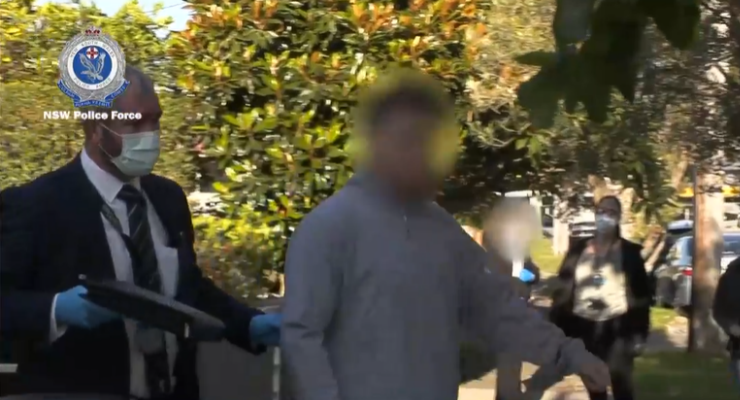
“Eight men have been arrested by NSW Police and charged with serious offences related to their alleged involvement in a child sexual abuse ring. One of the men, 40-year-old former NRL player Brett Finch, has been charged with five counts of using a carriage service to transmit or publish child abuse material.”
That would have been one way for the media to report this story. They did not.
I googled “Brett Finch”, and the top ranking results — each of which is a media report of his arrest — describe him variously as “former NRL star”, “NRL great”, “former in-demand star”, “former NRL and State of Origin star”, “former NRL grand final winner”, “fallen former NRL star” and “fallen rugby league star”. I didn’t have to navigate past the results page.
The headline on news.com.au is “How Brett Finch’s life spiralled out of control”, followed by “Former NRL star Brett Finch built a reputation as a loveable larrikin — but his recent arrest is another chapter in a downward spiral”.
Full credit to the media — they know who Brett Finch is. For their purposes, there is nothing he could do (actually or allegedly) which would not attract the honorifics which have been applied by default to his name, in the same way that another alleged child sex abuser is always referred to as “His Royal Highness Prince” Andrew.
Finch is entitled to the presumption of innocence, which simply means that nobody may declare him guilty of the charges against him unless and until a criminal court has delivered a verdict in those terms.
He is protected, additionally, by the sub judice contempt rule, which makes it a crime for anyone to publish anything that interferes with the due administration of justice by materially prejudicing his right to a fair trial.
None of that has any relevance to this situation. The media have chosen, as they always do when the person charged has even minor celebrity status, to frame their reporting of Finch’s arrest within the context of his claim to fame. It is a short step then, as news.com.au has already taken, to link these two unrelated matters — who he is and what he is alleged to have done — and embark on a speculative exploration of motive, opportunity and propensity.
Those things are elements of the alleged crime. There is no justifiable reason for the media to engage in their own investigation of these questions ahead of the criminal justice process. For one thing, contempt cuts both ways; it’s dangerous territory to be mining.
More importantly, while there is obvious public interest in connecting the big name and its back story to the salacious allegation, the media has a responsibility to not simply pander to that impulse.
There is a larger imperative here, which the media ought to be keeping in the front of its mind, especially after the revelations of this year: the endemic minimisation by society of sexual violence committed by men.
What Finch is alleged to have done is depraved and grotesque. If it is true, then his actions have caused, encouraged or aggravated the infliction of sexual abuse on children. If it is true, then the consequences for his victims have been horrific and for life.
It is not just that it’s absolutely irrelevant that he used to play professional sport and was a “star” at it, or that he used to have a drug problem, marital problems and mental health issues. These matters may become relevant in his criminal case, but they have no connection to what the alleged victims have suffered.
The bigger problem is that, by clothing him with his prior fame, the media are instantly and reflexively humanising him and, correspondingly, diminishing the gravity of what he is alleged to have done.
Yes, he is human. If he is acquitted, or convicted, then as many think pieces, profiles, tell-alls and true crime podcasts can be produced as the public is prepared to stomach, and every aspect of his make-up and history will be up for grabs.
In the meantime, only one thing matters and has any proper public relevance: the alleged crime. Our focus should be drawn to that, and in particular to its victims.
It is well past time for the media to catch up and cut out this automatic reflex of seeking to engage our emotions on behalf of men accused of appalling crimes of sexual violence and abuse, and point our attention instead towards the real human tragedy.
Seriously. Enough of this crap.
Survivors of abuse can find support by calling Bravehearts at 1800 272 831 or the Blue Knot Foundation at 1300 657 380. The Kids Helpline is 1800 55 1800. Further support is available at Lifeline is on 13 11 14 and Beyond Blue is 1300 22 4636. In an emergency, call 000.
Survivors and Mates Support Network (SAMSN) provides support for male survivors of child sexual abuse.
If you or someone you know is impacted by sexual assault or violence, call 1800RESPECT on 1800 737 732 or visit 1800RESPECT.org.au.








Crikey encourages robust conversations on our website. However, we’re a small team, so sometimes we have to reluctantly turn comments off due to legal risk. Thanks for your understanding and in the meantime, have a read of our moderation guidelines.